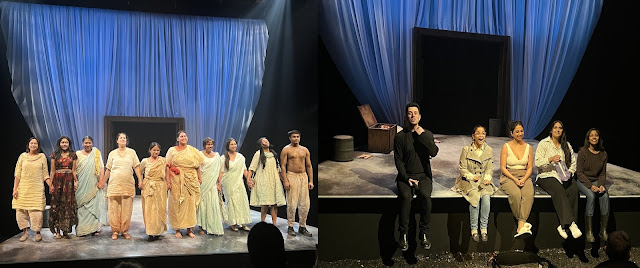The conflict between Hindus and Muslims in India dates back to the 7th century when Islam was first introduced into the country. During their colonial rule from 1757 to 1947, Britain tried to keep a lid on hostilities, with varying degrees of success. To facilitate their intention to end colonial rule in India, in 1947 Britain enacted the Indian Independence Act, which included a Partition that split the country into two separate independent sovereign states divided by religion—the Republic of India for the Hindus/Sikhs and Dominion of Pakistan for the Muslims. The Partition displaced over fifteen million people, creating an overwhelming humanitarian and refugee crisis in both new countries which led to families torn apart, homes destroyed and large-scale violence resulting in deaths of up to two million people.
It is in midst of this time of historic turmoil that Dora Award winning playwright Anusree Roy sets the imagined events in her thrilling play Trident Moon. The set is configured to represent the interior of a cargo truck that is motoring through Pakistan towards towards India. As the play begins, we see six females seated, kneeling or prone on the floor of the truck. The three on the left are dressed in ragged orangey-yellow linen saris and it is apparent that one of the women is injured with a bleeding wound at her abdomen while one is an intellectually disabled child. The three on the right are dressed in light blue saris that seem more elegant and expensive in style and material. They consist of two women who have their hands bound behind their backs and a young girl. The two sets of adult females verbally spar and hurl insults and each other. It becomes apparent that the wealthy Muslim employers have been kidnapped by their Hindu servants as some sort of revenge plot initially triggered by violence that occurred between their husbands. As the play goes on, we learn more about what happened to bring these women to this point.This blog describes the exploits of Rich and Annie in Toronto including the interesting events and attractions that this city offers
Tuesday, March 18, 2025
Theatre 2025: Trident Moon @ Crow's Theatre
Crow’s Theatre is known for its bold and edgy plays that do not shy away from difficult or even traumatic topics. In the past, we have watched a play with vignettes about the horrors of the 2014 Russo-Ukrainian War, as well as one dealing with the recollections of a female pastor who was kidnapped and tortured by a Neo Nazi mental patient. We knew that the play Trident Moon would be of the same vein, given that it is a fictional story set during the chaotic period of the 1947 Partition of India. We further braced ourselves for an intense experience when we read the trigger warning sign posted outside the theatre that cautioned us to expect depictions of death, physical and sexual violence towards women and children, strong language, discussions of rape, torture, murder, decapitation and derogatory language directed at a disabled person, as well as the use of prop guns, simulated gun fire, flashing lights, theatrical haze and fog, and loud noises. This is by far the most severe trigger warning that we have ever encountered. Compare this to a previous Crow’s Theatre show, Natasha, Pierre and the Great Comet of 1812, which warned us (tongue in cheek) about depictions of sleigh rides!
The “truck” is forced to stop several times throughout the action, as refugees of both religions seeking transport and marauders searching for riches attempt to board. Through the use of light and sound effects timed perfectly with jolting motions of the bodies in the truck, the stagecraft to simulate these stoppages is so effective that the audience can almost feel the motion from our seats.
This is an intensely harrowing tale that highlights the brutality of this traumatic time period and yet manages to highlight the strength of human resilience and a spark of humanity that gives hope to this tragedy. For such a violent time in history, it is interesting that most of the story is told through the eyes of women. Also of interest is the innocent interaction between the children who have not yet learned to hate or fear each other. In a talkback discussion with the playwright, who also portrayed one of the Muslim women, she stressed the importance of understanding that there are no real villains in the show. All the characters are victims of circumstance, acting out of fear, desperation and anger as they react to the tragedy of their situations. The actresses themselves represent both Hindu and Muslim religions and the comment was made in the talkback that although they loved each other fiercely, none of them could safely marry the other’s brothers without being disowned by their own families. The violence may have subsided but the divide remains as strong as ever.
This was an extremely well-acted and thought-provoking play that taught us about a time in history that had not been that familiar to us. By the end of it, we understood the significance of the title where the trident represents Hinduism and the crescent moon symbolizes Islam for the Muslims. Despite its difficult subject matter, this was a riveting show to watch and the 90 minutes just flew by.
Subscribe to:
Post Comments (Atom)



No comments:
Post a Comment